

No, Virginia, Iran isn't in Bed with Al-Qaeda (Abbotabad Trove) The al-Qaeda documents released by West Point’s Center for Combatting Terrorism (which needs to be better funded by Congress) show that the whole warmonger meme that Iran and al-Qaeda are in bed is a complete crock.
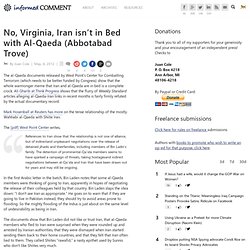
Ali Gharib at Think Progress shows that the flurry of Weekly Standard articles alleging al-Qaeda-Iran links in recent months is fairly firmly refuted by the actual documentary record. Mark Hosenball at Reuters has more on the tense relationship of the mostly Wahhabi al-Qaeda with Shiite Iran. The [pdf] West Point Center writes, Elements in Iran and US that Want War. Juan Cole, The Iran Conundrum. News Desk: Our Men in Iran? From the air, the terrain of the Department of Energy’s Nevada National Security Site, with its arid high plains and remote mountain peaks, has the look of northwest Iran.
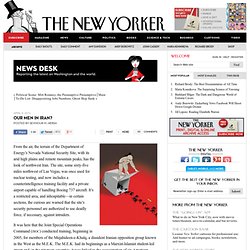
The site, some sixty-five miles northwest of Las Vegas, was once used for nuclear testing, and now includes a counterintelligence training facility and a private airport capable of handling Boeing 737 aircraft. It’s a restricted area, and inhospitable—in certain sections, the curious are warned that the site’s security personnel are authorized to use deadly force, if necessary, against intruders. It was here that the Joint Special Operations Command (JSOC) conducted training, beginning in 2005, for members of the Mujahideen-e-Khalq, a dissident Iranian opposition group known in the West as the M.E.K. The M.E.K. had its beginnings as a Marxist-Islamist student-led group and, in the nineteen-seventies, it was linked to the assassination of six American citizens. Illustration by Guy Billout.
Links on the Iran war drumbeat. The Effects of Sanctions and Talk of War in Iran. Hamid Dabashi: Threat of war makes Iran more of a "garrison" state as sanctions hurt ordinary people - Bio Hamid Dabashi is the Hagop Kevorkian Professor of Iranian Studies and Comparative Literature at Columbia University.
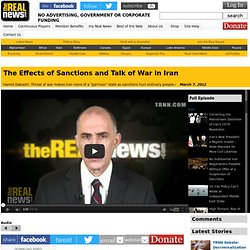
He received a dual Ph.D. in Sociology of Culture and Islamic Studies from the University of Pennsylvania in 1984, followed by a postdoctoral fellowship at Harvard University. He wrote his dissertation on Max Weber's theory of charismatic authority with Philip Rieff (1922-2006), the most distinguished Freudian cultural critic of his time. Professor Dabashi has taught and delivered lectures in many North American, European, Arab, and Iranian universities. Sanctions v. negotiations on Iran. (updated below – Update II) One of the most significant foreign policy controversies of the 2008 presidential election centered around Barack Obama’s pledge ”to meet separately, without precondition” with the leaders of Iran, Syria, Venezuela, Cuba and North Korea.
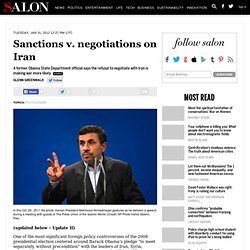
That seemingly off-the-cuff vow in response to a questioner at a July, 2007, Democratic primary debate was used first by Hillary Clinton, and then by John McCain, to depict Obama as naive, irresponsible, radical and — most ominously — overly sympathetic to America’s enemies (some liberal pundits echoed some of the same criticisms, while Mitt Romney is still trying to exploit that statement for those ends). Vs. Iran. A military strike on Iran ? Really ? Iran Drumbeat Watch: AIPAC Edition - James Fallows - International. 1) 'Too much loose talk.' Good for President Obama for saying this during his speech yesterday at AIPAC: Already, there is too much loose talk of war.
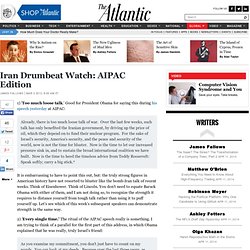
Over the last few weeks, such talk has only benefited the Iranian government, by driving up the price of oil, which they depend on to fund their nuclear program. Another March to War? NYT Misleads Readers on Iran Crisis. Drums of war: The US media's 'Iranian threat' - Listening Post. Erin Burnett: Worst of the worst. (updated below – Update II [Sat.]) I’m finishing up a long investigative article that will be posted later this morning, but I just could not let go unnoted this commentary on The Iranian Threat by CNN’s Erin Burnett (“frightening,” she observed). I barely know what to say about it — the critiques of media fear-mongering I wrote the last two days apply in spades to this — but it really just mocks itself. It’s the sort of thing you would produce if you set out to create a mean-spirited parody of mindless, war-hungry, fear-mongering media stars, but you wouldn’t dare go this far because you’d want the parody to have a feel of realism to it, and this would be way too extreme to be believable.
The media and Iran: familiar mindlessness. (updated below) The lesson supposedly learned by the U.S. establishment media from the Iraq debacle was the danger of relying on anonymous government sources to disseminate unverified fear-mongering accusations.
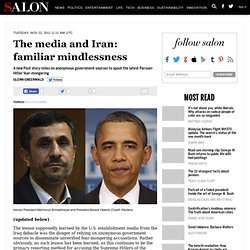
Rather obviously, no such lesson has been learned, as this continues to be the primary reporting method for accusing the Supreme Hitlers of the Moment — Iran — of anything and everything the U.S. Government can dream up. The latest entry, and one of the most egregious yet, is this Washington Post screed appearing under this headline and hovering scary picture: IRAN ESCALATION: All the Elements for War Are Coming Together.
With all the bluster of late in Western media that President Obama is assiduously working to “restrain” Israel from launching a preemptive attack on Iran, recent developments should put paid the lies of this dog-and-pony show.
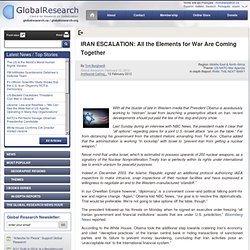
Last Sunday during an interview with NBC News, the president made it clear that “all options” regarding plans for a joint U.S. -Israeli attack “are on the table.” Far from distancing his government from the strident rhetoric emanating from Tel Aviv, Obama added that the administration is working “in lockstep” with Israel to “prevent Iran from getting a nuclear weapon.” Never mind that unlike Israel, which is estimated to possess upwards of 200 nuclear weapons, as a signatory of the Nuclear Nonproliferation Treaty Iran is perfectly within its rights under international law to enrich uranium for peaceful purposes.
In our Orwellian Empire however, “diplomacy” is a convenient cover–and political talking point–for war and regime change. Congress Pushes Iran Regime Change Over Diplomacy. Jahanpour: As US and Iran Confront Each other, where is the Diplomacy? Dr.
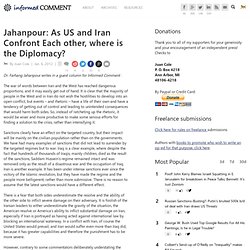
Farhang Jahanpour writes in a guest column for Informed Comment : The war of words between Iran and the West has reached dangerous proportions, and it may easily get out of hand. It is clear that the majority of people in the West and in Iran do not wish the hostilities to develop into an open conflict, but events – and rhetoric – have a life of their own and have a tendency of getting out of control and leading to unintended consequences that would harm both sides. So, instead of ratcheting up the rhetoric, it would be wiser and more productive to make some serious efforts for finding a solution to the crisis, rather than intensifying it. MJ Rosenberg: AIPAC's "War With Iran" Bill Passes House Committee. Wasting no time after its success in getting the administration to oppose Palestinian statehood at the United Nations, and still celebrating the UNESCO funding cut-off, AIPAC has returned to its #1 priority: pushing for war with Iran.
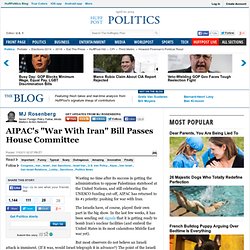
The Israelis have, of course, played their own part in the big show. In the last few weeks, it has been sending out signals that it is getting ready to bomb Iran's nuclear facilities (and embroil the United States in its most calamitous Middle East war yet). But most observers do not believe an Israeli attack is imminent. War Talk: The Obama Administration and Iran. “Let there be no doubt,” President Obama declared in his 2012 State of the Union address.
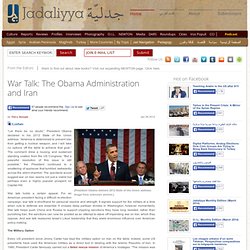
“America is determined to prevent Iran from getting a nuclear weapon, and I will take no options off the table to achieve that goal.” The comment drew a rousing and sustained standing ovation from the US Congress. “But a peaceful resolution of this issue is still possible,” the President continued to a smattering of applause that tumbled awkwardly across the silent chamber. The spectacle would suggest war on Iran seems not just a viable but perhaps even a highly popular prospect on Capital Hill. War talk holds a certain appeal. The Military Option.
Santorum Hypes Iran 'Threat' GOP presidential hopeful Rick Santorum warned North Dakota on Wednesday that it was in the cross-hairs of an Iranian attack. Among the news about Iran that had Americans thinking about that country was an announcement that Iran is making its own nuclear fuel and using it for a reactor. Iran has a small medical research nuclear reactor, which produces nuclear isotopes for use in chemotherapy. The reactor requires uranium enriched to 19.75 percent to run. Iran announced on Wednesday that it had managed to enrich to that level , and is now installing the homemade fuel plates in the reactor. The medical reactor was given to Iran by the United States and was inaugurated in 1967. The reactor actually has no conceivable military purpose, and its fuel, uranium enriched to 19.75 percent, is used up when run through the reactor, so it cannot be used to make a nuclear warhead. CNN had P.J. Why aren't we negotiating with Tehran. The drumbeats for war with Iran keep pounding, as you can read about here and here.
There are some features of the campaign that are scarily (or maybe comically) reminiscent of 2002-2003 (as Glenn Greenwald documents here), but for now there's one key difference. Back in 2002, the neocon-heavy Bush administration led the charge to sell the invasion of Iraq. Today, by contrast, the case for war is being made primarily by other countries (i.e., Israel), or by assorted think tanks, lobbying groups, and national security commentators in the United States. The Obama administration isn't leading the campaign, having correctly concluded that a war is neither necessary nor wise. A Martian view of the Iran debate. Paul Pillar has a great piece up at The National Interest that illuminates just how nutty the present debate about war with Iran really is.
And it got me thinking. If a sensible Martian came down to Earth and looked at the sabre-rattling about Iran, I suspect he/she/it would be completely flummoxed. For our Martian visitor would observe two very capable states -- the United States and Israel -- threatening to attack a country that hardly seems worth the effort. The U.S. and Israel together spend more than $700 billion each year on their national security establishments; Iran spends about $10 billion. How to Engage Iran. Since the 1979 Islamic Revolution, two major schools of thought have influenced Iran's foreign policy toward the United States. Gary's choices - Who’s Afraid of the Ayatollahs? The neocons' big Iran lie - Iran.
In February 2003, less than a month before the U.S. -led invasion of Iraq, Gen. Annals of National Security: The Iran Plans. The Bush Administration, while publicly advocating diplomacy in order to stop Iran from pursuing a nuclear weapon, has increased clandestine activities inside Iran and intensified planning for a possible major air attack. Current and former American military and intelligence officials said that Air Force planning groups are drawing up lists of targets, and teams of American combat troops have been ordered into Iran, under cover, to collect targeting data and to establish contact with anti-government ethnic-minority groups. The officials say that President Bush is determined to deny the Iranian regime the opportunity to begin a pilot program, planned for this spring, to enrich uranium.
American and European intelligence agencies, and the International Atomic Energy Agency (I.A.E.A.), agree that Iran is intent on developing the capability to produce nuclear weapons. When I spoke to Clawson, he emphasized that “this Administration is putting a lot of effort into diplomacy.” Iran Business Partners: Cheney & Reagan, not Just the Koch Brothers. The “very scary” Iranian Terror plot. The most difficult challenge in writing about the Iranian Terror Plot unveiled yesterday is to take it seriously enough to analyze it. Iranian Muslims in the Quds Force sending marauding bands of Mexican drug cartel assassins onto sacred American soil to commit Terrorism — against Saudi Arabia and possibly Israel — is what Bill Kristol and John Bolton would feverishly dream up while dropping acid and madly cackling at the possibility that they could get someone to believe it. But since the U.S. Government rolled out its Most Serious Officials with Very Serious Faces to make these accusations, many people (therefore) do believe it; after all, U.S. government accusations = Truth.
All Serious people know that. History of U.S. Intervention in Iran - 1953 Until Present.